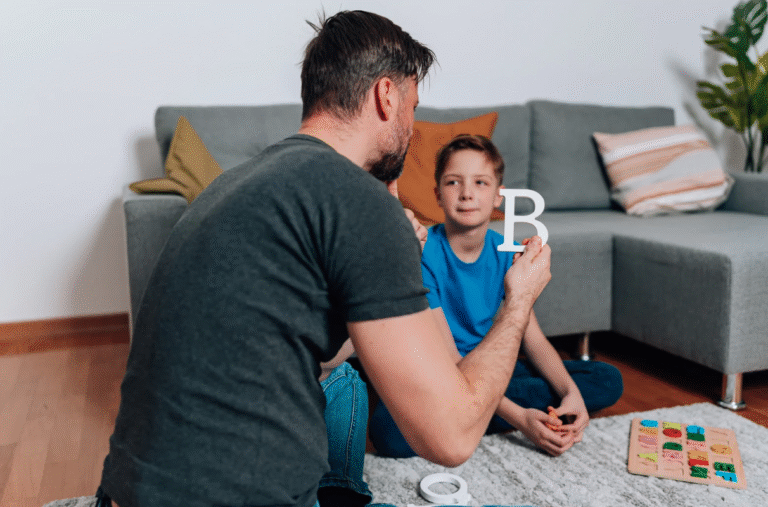How Pediatric Speech Therapy Builds Confidence, Connection, and Everyday Skills
When people think of speech therapy for children, they often picture a child learning to pronounce sounds more clearly. While that’s definitely one important piece of the puzzle, speech therapy is much broader and more impactful than many realize.
Speech therapy can support children in ways that go far beyond speech itself. From helping little ones express their needs and understand others to guiding social interactions and even addressing feeding difficulties, speech-language pathologists (SLPs) play a powerful role in a child’s development. Whether your child is navigating speech delays, sensory sensitivities, or social communication challenges, speech therapy can be a life-changing tool.
In this guide, we’ll explore the top 5 things pediatric speech therapy can help with, how therapy works in each area, and what to expect if you’re considering support for your child.
1. Speech and Sound Production (Articulation)
Is your child hard to understand when they speak? Do they struggle with sounds like “r,” “l,” or “th”? These challenges are known as articulation or phonological issues, and they’re incredibly common, especially in toddlers and preschoolers. But if these speech patterns persist beyond a certain age, it can interfere with school readiness, peer relationships, and self-confidence.
How Speech Therapy Helps:
SLPs are trained to assess which specific sounds are difficult and why. They use engaging, age-appropriate activities to teach correct placement of the lips, tongue, and jaw. These might include games, songs, mirror work, and interactive apps.
Over time, this targeted practice helps children improve their speech intelligibility, meaning people can understand them more clearly. And as their speech improves, so does their confidence in expressing themselves.
2. Language Development (Understanding and Expressing)
Speech therapy isn’t only about how your child sounds, it’s also about what they’re saying and how well they understand language. Some children may have strong speech but struggle to use or comprehend language. This can show up as:
- Trouble following directions
- Difficulty naming objects or actions
- Limited vocabulary
- Delayed sentence formation
- Minimal verbal expression
How Speech Therapy Helps:
SLPs support both expressive language (what your child says) and receptive language (what your child understands). Through play-based therapy, storytelling, books, and conversation practice, they help children expand their vocabulary, improve sentence structure, and build listening skills.
Children who were once quiet or frustrated often begin to blossom, asking questions, engaging in conversation, and expressing thoughts more easily.
3. Social Communication (Pragmatic Language)
Some kids can speak clearly and use full sentences, but still struggle to connect with others. Communication isn’t just about words; it’s also about how and when we use them. This area is called pragmatic language, and it includes things like:
- Taking turns in conversation
- Making eye contact
- Reading facial expressions or body language
- Understanding sarcasm, humor, or figurative speech
- Starting or maintaining a conversation
Children with autism spectrum disorder, ADHD, or social anxiety may face particular difficulties with pragmatic language.
How Speech Therapy Helps:
SLPs create a safe, supportive space for children to practice social skills. Through role-play, group interactions, visual supports, and games, kids learn the “unwritten rules” of communication. They build not just language skills, but the ability to make friends, navigate group settings, and develop meaningful relationships.
4. Feeding and Swallowing (Oral-Motor Skills)
You might be surprised to learn that speech therapists also help with feeding challenges. That’s because the muscles used for speech are the same ones involved in chewing and swallowing. Children who experience gagging, food refusal, or difficulty with textures may be struggling with oral-motor coordination or sensory processing.
How Speech Therapy Helps:
An SLP can assess oral tone, strength, and coordination. They work to improve jaw stability, tongue movement, and safe swallowing. They also collaborate with occupational therapists and dietitians when needed.
Therapy may involve exercises, play-based exposure to new textures, and strategies for reducing anxiety around mealtime. The goal is to promote safe, healthy eating routines and reduce stress for both kids and parents.
5. Fluency (Stuttering or Cluttering)
Some children experience stuttering (repetitions or blocks in speech) or cluttering (speaking too quickly or disorganized). These issues can be especially frustrating because they often show up during moments of excitement or stress. Children may avoid speaking altogether, feel embarrassed, or become anxious in group settings.
How Speech Therapy Helps:
Fluency therapy focuses on teaching children how to speak more smoothly, using techniques to reduce tension and build rhythm. Beyond mechanics, SLPs also help children manage their emotions around communication.
They teach self-advocacy, build resilience, and coach parents on how to support their child in everyday conversations. This combination of tools empowers children to speak more freely and confidently.
Why Early Intervention Matters
The earlier communication challenges are addressed, the more successful therapy tends to be. Young brains are adaptable and capable of forming new neural connections quickly. Early speech therapy lays the foundation for:
- Academic success
- Social development
- Emotional regulation
- Independence
If you have concerns about your child’s speech, language, or feeding skills, even if they seem minor, trust your instincts. A speech and language evaluation can provide clarity, guidance, and peace of mind.
How Crawl Walk Jump Run Therapy Clinic Can Help
At Crawl Walk Jump Run Therapy Clinic, we understand that every child’s communication journey is unique. That’s why our licensed speech-language pathologists take a personalized approach, creating fun, supportive, and goal-oriented therapy sessions designed to help your child thrive.
We support children of all ages and abilities with a wide range of needs, from first words and articulation delays to social skills and feeding therapy. And we believe in partnering with parents every step of the way, because you know your child best.
Ready to Take the First Step?
If you’re wondering whether your child might benefit from speech therapy, let’s talk. We offer free consultations and comprehensive evaluations to help you decide what’s next. Contact us today to schedule your child’s speech and language evaluation.




